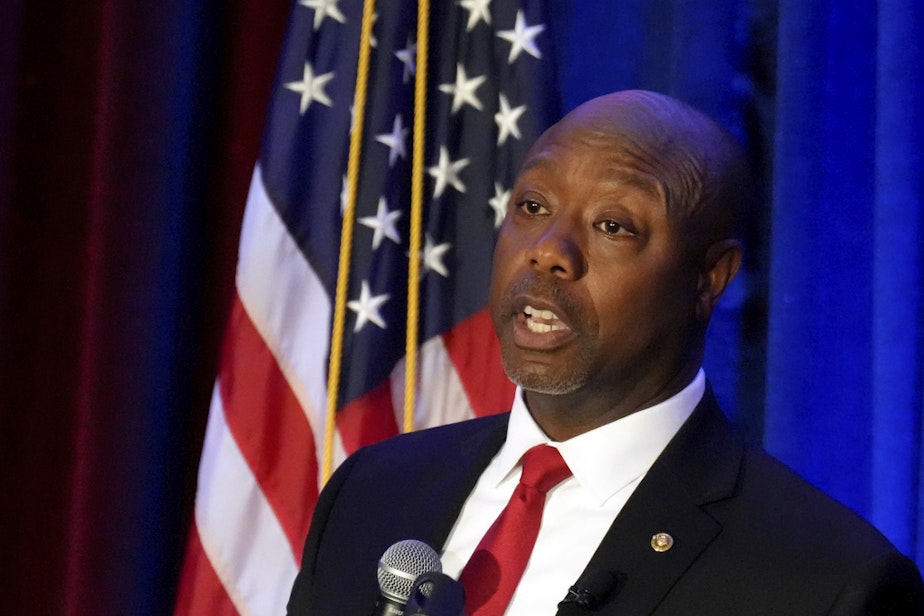Balancing downtown Seattle and the future of remote work: Today So Far

- Seattle is at a crossroads. Can it balance helping downtown's struggling businesses with a future of remote work?
- There's that word again — "gubernatorial."
This post originally appeared in KUOW's Today So Far newsletter for May 23, 2023.
Well this is awkward. On one hand, you have downtown Seattle struggling out of the pandemic era, with low foot traffic and businesses eagerly watching for office workers to return. On the other hand, there are office employees now being asked to come back to the office, but perhaps don't really want to and are willing to protest over it.
Just weeks after Amazon started mandating that employees return to its Seattle offices at least three days a week, a group of workers have started organizing a walkout in protest. The hour-long walkout is slated for noon on May 31, but organizers say they'll only do it if they can get 1,000 co-workers to sign on to participate. Employees at Amazon offices outside of Seattle are encouraged to walk out, too. According to The Seattle Times, there are folks at other offices aiming to participate.
There are two employee activist groups behind this protest. One you've likely heard of, which is Amazon Employees for Climate Justice. They've organized demonstrations in the past, pushing for the company to adopt more climate-friendly policies. The second group emerged after the company recently began its new in-office policy on May 1. The group "Amazon Remote Advocacy" reportedly came about after 30,000 co-workers joined a "remote advocacy" Slack channel in recent weeks. Among their arguments is a statement that employees should have a say in decisions that affect their lives (and the climate), such as returning to the office, as well as the effect on more vulnerable employees.
According to a statement from the groups: "The world is changing, and Amazon needs to embrace the new reality of remote and flexible work if it wants to remain an innovative company that attracts and retains world-class talent."
KIRO Radio recently looked at traffic data and noted that since Amazon's in-office move started, traffic times leading into Seattle have slowed by as much as 38% on some routes. It's anecdotal, but it's being called the "Amazon effect." It should be noted that Amazon is not the only company in town doing this. Starbucks started a similar policy this year.
Sponsored
This is where things get awkward, because there is no easy answer around all of this. For months now, downtown business leaders have been begging everybody from city hall to local offices to bring employees back into Seattle. The core argument here is that foot traffic downtown is a shadow of the Before Times. The presence of office workers is about 26% of pre-pandemic levels (according to reporting from March). Without such people coming into town and leaving their dollars behind, local businesses have been suffering.
The Downtown Seattle Association's most recent data states that incoming worker traffic "continues to improve."
"April 2023 saw the second-highest level of daily worker foot traffic since the start of the pandemic, averaging more than 73,000 visits daily."
It has been a struggle to improve conditions downtown, and that struggle has put Seattle at a crossroads. The city can either double down on the way things were before pandemic disruptions, or carve a new sustainable path. Which is best? Which is easiest? Right now, it seems that the city's leaders are leaning back into the old office ways.
To borrow an oft-used tagline from Mayor Bruce Harrell, this crossroads could be an opportunity to hit "reset" on the city, and build back better to manage our region. That's an argument going around town right now as one solution to downtown woes. The old way meant getting people in their cars to commute into Seattle, cramming everyone into one spot — spend a couple hours in a car to work in a cubicle eight hours. A new way would mean redefining Seattle, perhaps creating a downtown where people can actually live, and those residents can support the local neighborhood. There are indications that this sort of local support happened more widely among Seattle's suburbs during pandemic shifts, places where people live and work remotely. Those Seattle neighborhoods have remarkably low retail vacancy rates. The fact that things worked out differently in downtown should be big red flag for city leaders. Actually, the businesses that catered to downtown residents were the ones who fared better during this time. After all, the downtown area is about half office space ... much of which has not been recently used.
It should be noted that the DSA also recently reported that occupied downtown apartments are at record highs. It also states that the "the pace of growth is moderating" when it comes to downtown apartments.
Fewer commuting office workers means better roads for those who don't have a remote-work option. I'm primarily thinking about our region's health-care workers who are commuting in from more affordable communities. Lower income workers are more likely to hit the road, too.
That's what Seattle faces right now. Groups of employees who prefer to work at home, and a downtown community that would like to see more folks in offices (and their shops). Will the Amazon activists get enough co-workers to sign on and walk out? Will someone point out that this demonstration is essentially over the lunch hour? Will Amazon feel the need to respond? We'll find out on May 31.
KUOW's Bill Radke is dissecting our language even more this week in the latest edition of "Words in Review" all focused on the term "gubernatorial." TSF also covered this work in a recent "Did You Know" segment — you know, that section below that you humor me with as I nerd out about random factoids, which I inevitably link to movies in some way. The gist of that section was that "gubernator" and "gubernatorial" were the original Latin version of the word. It evolved from there and the French added a "v," which the English took on and today we have "governor." Yet, in the USA, we use "gubernatorial" when referencing elections, instead of saying "governor's race" or "race for governor."
Sponsored
Bill dove a little deeper into this history while chatting with University of Washington classics professor Sarah Stroup. It turns out, the origins of the word are quite metaphorical.
"It comes from the Latin word 'gubernator' like the pilot or the steersman of a ship," Stroup said. "The Mediterranean doesn't have a lot of this thing that's called 'sea room;' sea room is how far you can be blown off course in a storm before you hit something. The Pacific, for instance, has a great deal of sea room; you can be blown off course for days and you're fine. The Mediterranean does not, because you're going to hit something pretty quickly. In the ancient world, and in this place in the world, the idea of a ship and state and the gubernator being the most important person was really meaningful."
They go into a lot more, and thankfully, Van Halen is involved (yep!). Check that out here.
AS SEEN ON KUOW

Sponsored
"Wolf Play" at the ACT Theatre is KUOW arts reporter Mike Davis' recent pick of the week. "Wolf Play" tells the story of a little boy, known as Wolf, who is struggling to find his pack. Before the play starts, we learn that while the boy is Korean, the story is about Americans. We are slammed into the middle of the “rehoming” process. We see Wolf delivered to a new family and through his eyes we experience his world shift as his father explains to him that he will have a new home. The emotions from the adults, the terror of the child, a pressure cooker situation that eventually explodes into violence. It's scene that Davis says will live with the audience long after seeing the play. (Jim Bennett)
DID YOU KNOW?
With all this talk about words lately, I'm reminded of the language of esperanto. This is a real language, in the same way that Tolkien's Elvish Quenya and Sindarin are languages. Also, the same way that Klingon and Vulcan are languages. They're all constructed. They didn't come about naturally, though Esperanto was invented decades before these pop culture references, and with an entirely different purpose.
In the 1880s, a Polish eye doctor named L. L. Zamenhof invented esperanto with the intent that it be a universal language to bridge different parts of the world. Live in Japan, Germany, Brazil, or Ohio? No problem if you all speak esperanto as a second language. Of course, this was before folks started learning English by simply watching "Friends."
Zamenhof pulled most of esperanto from existing Indo-European dialects and tweaked them to construct his new language. Today, about 100,000 people speak esperanto, which is probably more than the number of people who speak Vulcan, but not nearly as cool. Also, a handful of films have been made using the language, one of which is 1966's black-and-white horror film "Incubus" starring actor William Shatner.
Sponsored
ALSO ON OUR MINDS

Republican Sen. Tim Scott is officially running for president
South Carolina Sen. Tim Scott announced his run for the Republican presidential nomination this week in North Charleston, S.C.

